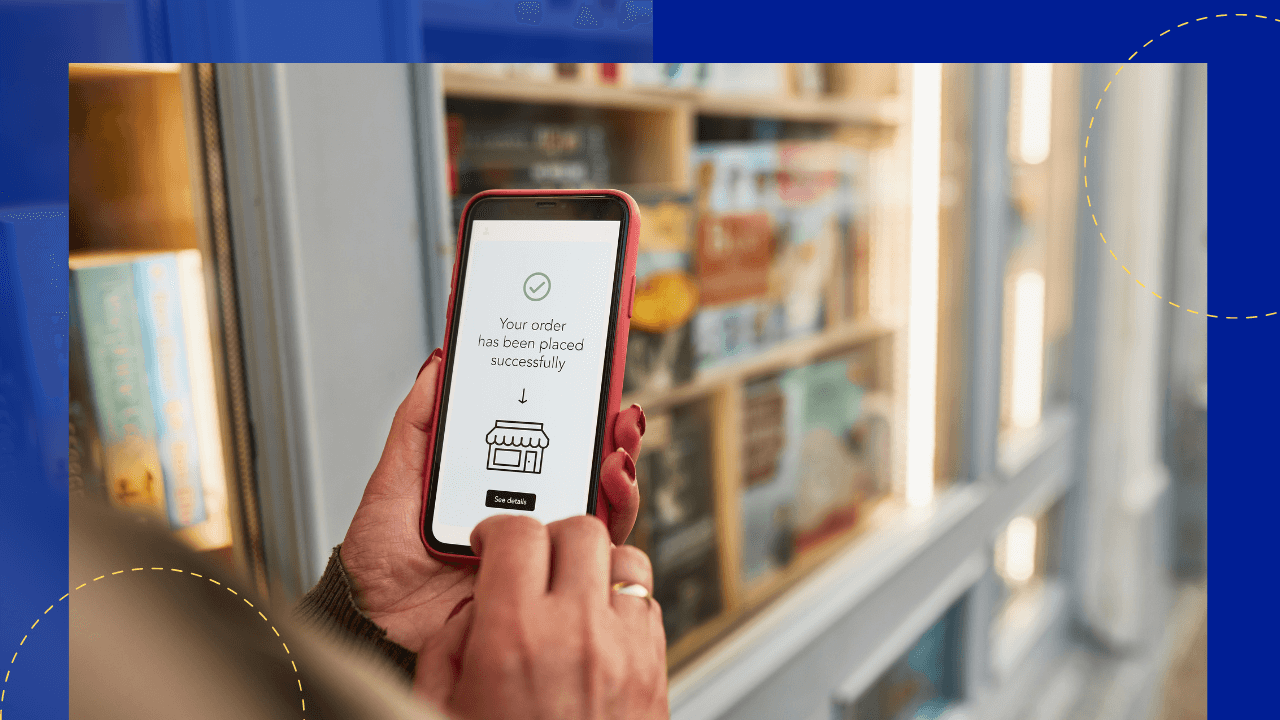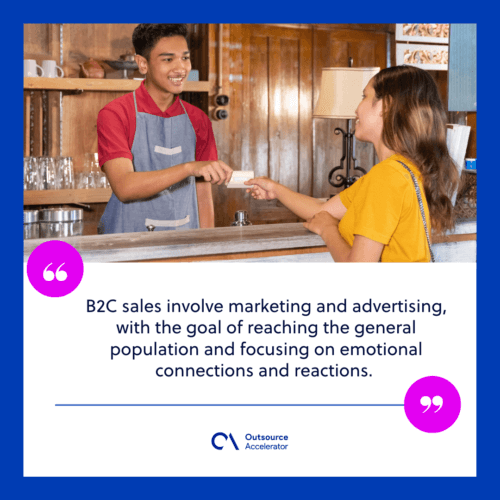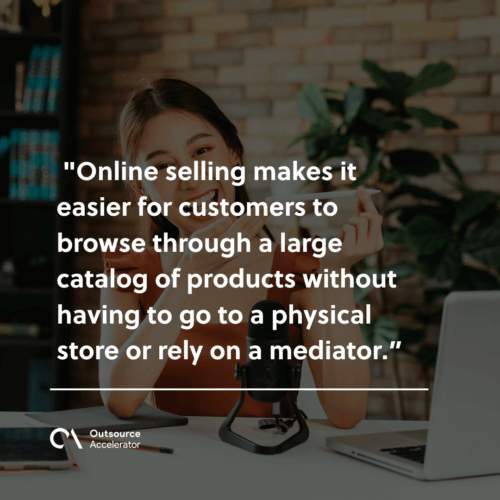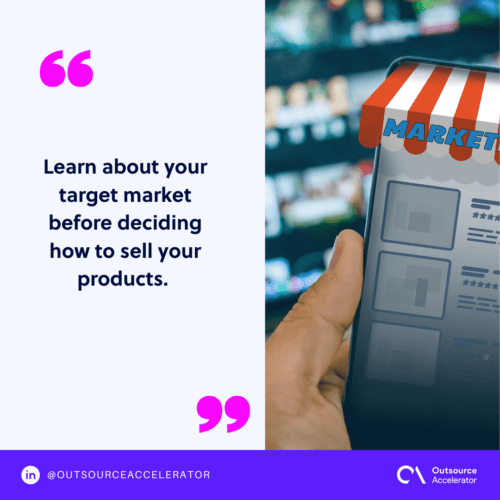Understanding the 10 different types of sales

Some may think sales is all about just making money, which is not untrue. That is just one small part of the entire sales process.
Other than money, sales is also about strategizing and making meaningful connections with customers and fellow businesses.
It is important to examine the different types of sales and how each one works to learn more about the entire sales journey.
10 different types of sales to remember
There is more than just one type of sales strategy. Each one has different elements that help businesses move closer to their objectives.
1. B2B sales
B2B sales, also known as business-to-business sales, are sales between two businesses. It works similarly to a regular buyer-seller relationship, but in this case, the participating parties are both businesses.
These are more focused on forming long-term relationships through continuous sales. There are three different types of B2B sales:
- Supply sales – Selling goods, services, and other supplies needed by other businesses
- Distribution sales – Selling products to distributors who then sell them to consumers
- Services sales – Selling of digital or intangible products, like software or consultants
These sales typically take longer to complete due to more complicated and high-value transactions. Not to mention that some businesses have multiple buyers and other people playing a part in the transaction process.
2. B2C sales
If B2B sales focus on business-to-business sales, B2C sales, also known as business-to-consumer sales, are between a seller and an individual.
Contrary to B2B sales, B2C sales are not as complex, take a lot faster to close, and have lower economic value. It can include physical, in-person selling like in malls or restaurants, as well as digital means like e-commerce selling.
B2C sales involve marketing and advertising, with the goal of reaching the general population and focusing on emotional connections and reactions.

3. Inside sales
Inside sales are when brand representatives interact with prospective clients in hopes of converting them into loyal customers.
This is usually done in an office or remote location where representatives do not have to meet face-to-face with their clients. It happens on various communication channels, such as emails, social media, phone calls, or online chats.
Inside sales reps focus mainly on lead generation and sales prospecting, where they contact people who have already expressed interest in their products or services.
There are two ways inside sales agents interact with their prospects: through inbound or outbound sales.
Inbound sales involves the prospect making the first move and contacting the brand about a product or service, while outbound sales is the other way around.
4. Outside sales
Outside sales is about meeting with potential customers face-to-face to discuss products. This is the more “traditional” sales approach, similar to door-to-door sales.
Representatives meet with prospective customers in a physical location and try to close a deal by explaining a product or service.
Additionally, this is a chance to form fresh relationships with customers in hopes of eventually turning them into a potentially loyal customer.
5. Enterprise sales
Enterprise sales are large-scale sales involving large corporations. Unlike the previous types, these sales are made over a long timeline, often with complicated processes and high risks.
Also known as complex sales, this type of sales produces high-value deals and has a long sales cycle. Not only is the main company involved, but so are several stakeholders.
Due to its longer and more complex process, enterprise sales is not always as straightforward as B2C or inside sales. It is done with the goal of maintaining long-term relationships between buyer and seller even after the initial transaction.
Enterprise sales can be described as a high-risk, high-reward type of sales. It is a high-pressure process that uses up a lot of time and resources.
Still, it eventually lands companies the necessary revenue, long-term stability, and customers needed to survive in the market.
6. Direct sales
Contrary to the lengthy nature of enterprise sales, direct sales is the most common and straightforward type of sales.
Direct sales, also known as direct-to-customer (D2C) sales, involve a customer buying a product from a seller without any third parties involved.
Similar to B2C and inside sales, direct sales involves reaching out to customers and offering them a product or service. Here, you will explain the product details and try to move them across the sales funnel.
7. SaaS sales
SaaS stands for Software as a Service and involves selling web-based software. Customers and businesses can purchase this software through subscriptions.
The software is hosted by a service provider who puts it in a data center. Customers can access this software using an internet connection.
SaaS sales work just like any other type of sales; the only difference is your product is digital software.
Instead of paying for a product one time and then keeping it forever, purchasing software requires customers to make monthly payments throughout usage.
Additionally, SaaS sales representatives must have deep knowledge of the software they are selling so they are ready in case customers encounter problems.
8. Online sales
Online sales is also known as e-commerce selling. It is one of the most common sales types today, especially given the recent rise of online stores and e-commerce platforms over the past few years.
This type of sales involves customers using the internet to access digital stores and e-commerce websites and purchasing products online.
Online selling makes it easier for customers to browse through a large catalog of products without having to go to a physical store or rely on a mediator.

9. Social sales
Social selling is utilizing your brand’s channels and social media presence to sell products and reach out to potential customers.
Given the massive reach of social media platforms like Facebook and LinkedIn, brands are more likely to find someone who will close the deal.
Social selling emphasizes the importance of forming genuine relationships with your customers through personal interactions, such as responding to questions and offering solutions.
10. Referral sales
Referrals are a powerful way to spread the word about your business. Word-of-mouth marketing is one of the most effective ways to encourage customers to buy from a specific brand.
Customers are more likely to consider your brand if they hear positive feedback and experiences from previous customers. Companies create referral programs that offer incentives, such as rewards or discounts, for referring their brand to others.
This type of sale is built on creating a positive customer journey, so much so that it prompts your buyers to recommend your brand to others.
How to choose the best type of sales
Choosing the best sales type depends on several factors. Consider the following criteria when figuring out which type of sales is best for your business:
Industry norms
Consider your industry and the different norms associated with it. Ask yourself questions such as:
- How do other companies in your industry approach their sales?
- What different sales types are they utilizing?
- What specific actions are they doing that you are not?
Understanding the competition is always a good way to determine what the best strategies are. This allows your company to see what others are (or are not) doing and what works best.
Taking the time to research other brands puts you a step ahead of the competition as you can come up with new ideas that will guide your sales strategy.
Long-term goals
The right sales strategy will help you achieve your long-term goals. Try working backward and figuring out these goals first before deciding which sales tactic will get you there.
For example, if your goal is to create lasting relationships with customers, the best sales type would be one that allows you to interact with them directly, such as B2C or social selling.
Another example would be to create a B2B business model if your goal is to land a partnership or working relationship with another company.
Target audience
Consider your target audience and demographic for your business. One sales type may work for one group of customers but may not for another.
Learn about your target market before deciding how to sell your products. The better you know your customers, the easier it will be to tailor your sales approach to them.

Sales cycle length
Each sales type has different sales cycle lengths. Consider the type of product you are selling and how long it would take to close a deal.
For example, direct sales are best for low-value, short-cycle sales, while business-to-business and enterprise selling approaches usually take longer and are more complicated.
Which type of sales should you choose?
There are so many different types of sales that businesses can utilize.
Some even use a combination of different types to yield the best results possible. Either way, no one type of sales is best, as it all depends on your company, products, and services.
Regardless of the sales type you choose, remember to monitor performance continuously, gather feedback, and be as flexible as possible.
You never know when you will have to change approaches.







 Independent
Independent




